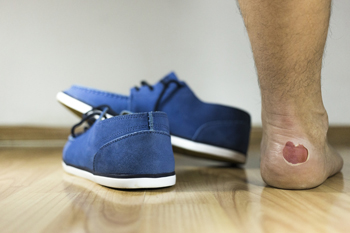What Is a Blister?
Monday, 13 May 2019 00:00 Many runners are familiar with the pain and discomfort that blisters on the feet can bring. They are typically caused by friction as a result of wearing poorly fitting shoes, or non-absorbent socks. When the skin becomes raw and damaged, a blister will form to protect the skin. It is filled with fluid that will naturally drain when new skin has formed over the affected area. If the blister should rupture before the healing process is completed, the possibility of getting an infection may increase. There are methods that can be implemented to possibly prevent blisters. These include choosing shoes that fit correctly and covering the area with a bandage where blisters are most likely to develop. Additionally, it is beneficial to use a foot powder that helps to absorb moisture. If you have a blister on your foot that is not healing correctly, please consult with a podiatrist who can properly treat this condition.
Many runners are familiar with the pain and discomfort that blisters on the feet can bring. They are typically caused by friction as a result of wearing poorly fitting shoes, or non-absorbent socks. When the skin becomes raw and damaged, a blister will form to protect the skin. It is filled with fluid that will naturally drain when new skin has formed over the affected area. If the blister should rupture before the healing process is completed, the possibility of getting an infection may increase. There are methods that can be implemented to possibly prevent blisters. These include choosing shoes that fit correctly and covering the area with a bandage where blisters are most likely to develop. Additionally, it is beneficial to use a foot powder that helps to absorb moisture. If you have a blister on your foot that is not healing correctly, please consult with a podiatrist who can properly treat this condition.
Blisters are prone to making everyday activities extremely uncomfortable. If your feet are hurting, contact Dr. Ronald K. Olm of Grand Traverse Foot & Ankle Center. Our doctor can provide the care you need to keep you pain-free and on your feet.
Foot Blisters
Foot blisters develop as a result of constantly wearing tight or ill-fitting footwear. This happens due to the constant rubbing from the shoe, which can often lead to pain.
What Are Foot Blisters?
A foot blister is a small fluid-filled pocket that forms on the upper-most layer of the skin. Blisters are filled with clear fluid and can lead to blood drainage or pus if the area becomes infected.
How Do Blisters Form?
Blisters on the feet are often the result of constant friction of skin and material, usually by shoe rubbing. Walking in sandals, boots, or shoes that don’t fit properly for long periods of time can result in a blister. Having consistent foot moisture and humidity can easily lead to blister formation.
Prevention & Treatment
It is important to properly care for the affected area in order to prevent infection and ease the pain. Do not lance the blister and use a Band-Aid to provide pain relief. Also, be sure to keep your feet dry and wear proper fitting shoes. If you see blood or pus in a blister, seek assistance from a podiatrist.
If you have any questions, please feel free to contact one of our offices located in Traverse City and Kalkaska, MI . We offer the newest diagnostic and treatment technologies for all your foot care needs.





